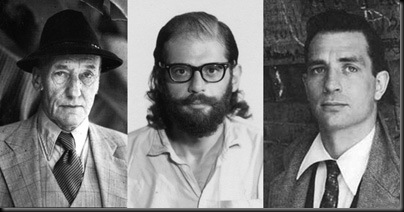“I saw the best minds of my generation destroyed by
madness, starving hysterical naked,
dragging themselves through the negro streets at dawn
looking for an angry fix,
angelheaded hipsters burning for the ancient heavenly
connection to the starry dynamo in the
machinery of night…” – “Howl” by Allen Ginsberg
“i find them largely tedious and often false. more on this later...” – Scott
William Burroughs. Allen Ginsberg. Jack Kerouac. Yes, they were self-indulgent, undisciplined, and sometimes down-right deconstructive. There were several Kerouac books that I started and never finished. Burroughs always struck me as grotesque and graceless in his prose. I loved Ginsberg.
I first read Ginsberg at the ripe old age of seventeen, and he was a revelation then. I understood “angelheaded hipsters burning for the ancient heavenly connection to the starry dynamo in the night.” It was like he was reading my mail. Whether the poetry was good or not, I wasn’t able to say. I had been schooled in all of the classic forms of poetry -- iambic pentameter, blank verse, free verse, haiku, the sonnet, and all that jazz, and it didn’t communicate to me at all, except if you were writing a song lyric and I didn’t do much of that.
For me, the Beat literature provided an unfiltered channel to the “counter-culture.” What we got from the mainstream media was a highly sanitized view of what was going on, even in rock music. The Beat literature had no such filters. I guess the cultural statement was more important to me than the quality of the literature or the veracity of the reporting. This was a genuinely different point of view powerful enough that people banned the books and charged the publishers with obscenity. It was powerful enough that the authors were willing to endure the critical abuse and legal harassment to publish it. It got my attention.
That alternative point of view included illicit drugs and forbidden sex, and it lit me up. I had never read “literature” like that before. Also, it contained something that came near to a justification for their reckless experimentation. They were like psychic astronauts blasting into the hostile reaches of the unconscious and the taboo. It was hedonistic, but the hedonism had a purpose – “Everything in excess.” It was as if some dark magical secret had been revealed.
In psychological time, that was a million years ago. I moved on to more grown-up tastes in poetry and literature, and eventually gave up poetry altogether because I became convinced that the only people reading poets were poets, and they did so begrudgingly, and I didn’t want to be limited to such a small audience that seemed to shrink every day.
In retrospect, the Beats do look careless, self-indulgent, dangerous to themselves and those around them, undisciplined and ultimately untenable. The same things that made them exciting wrecked their credibility. How do you take seriously a junkie queer who murdered his own wife playing “William Tell” with a handgun? Do you want to freeze to death counting railroad ties in Mexico, loaded up with booze and Secobarbital at the ripe old age of 46 like Neal Cassady? There can be little doubt that the critical ridicule faced by Kerouac hastened the end of his life. Ginsberg weathered the storm better than the others, but he did it by replacing the drinking and drugging with his version of Buddhism. I did some exploration into Buddhism but realized early on that I wasn’t cut out to be a Zen master. What do you do with the legacy of the Beats?
I know that for me, at a particular moment in time, they were vitally important. Their work was like a window on a strange and alien world that fascinated me. Maybe I’m secretly glad that they did what they did so that I didn’t have to do it. They showed us where the trapdoors were by falling through them. More importantly, they seduced us into launching our own psychic space probes. They had a real impact.











0 comments:
Post a Comment